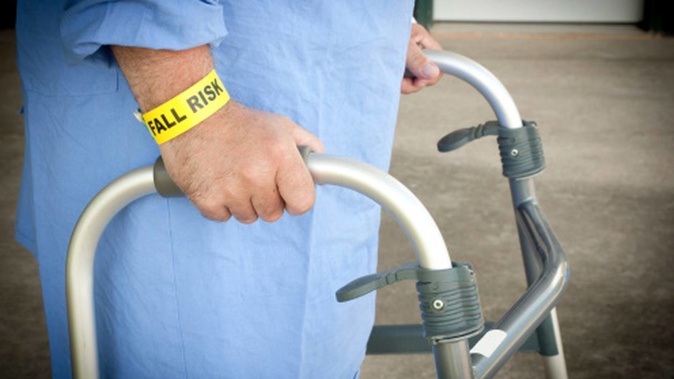

An elderly man who lay in bed with a broken neck made countless complaints to hospital staff that he was in agony before dying two days later.
The man, identified as Mr A in a Health and Disability Commissioner’s investigation, fractured his vertebrae during a fall in hospital.
It was the fourth one in a week and he was left lying on the ground calling out for help for 20 minutes before staff came to his aid.
Now, the Health and Disability Commissioner (HDC) has found Te Whatu Ora Hauora a Toi Bay of Plenty has breached the Code of Health and Disability Consumers’ Rights by demonstrating a pattern of “poor care and a culture of non-compliance” with policies.
Mr A, in his eighties, had a complex medical history including prostate cancer and had an ileostomy, a catheter, and a nephrostomy tube.
He was described as “frail” and experienced chronic pelvic pain as well as being at high risk of falling.
On January 14, 2019, he was admitted to hospital through the Emergency Department to manage his pain levels and a fall prevention plan was put in place.
While Mr A had a catheter, he found relief in sitting on the toilet and would spend up to 20 minutes there.
The plan stated not to leave Mr A alone if he was out of bed and he was told to ring his bell when he needed assistance in getting back to bed.
/cloudfront-ap-southeast-2.images.arcpublishing.com/nzme/7BXVC5LCNFSP3R4GOLOPJBSFYQ.jpg)
Te Whatu Ora - Hauora a Toi Bay of Plenty was found to have breached the Code by failing to reasonably care for Mr A, who died after a fourth fall. Photo / George Novak
Te Whatu Ora Hauora a Toi Bay of Plenty stated it was not possible to have staff wait for Mr A to finish on the toilet for lengthy periods of time but that he would be watched “as closely as possible”.
On January 16 Mr A had an unwitnessed fall and was found on the floor by a nurse. He had multiple skin tears on his leg, a graze on his hip and his heart rate had increased.
An incident report was made, and further precautions were put in place including a clutter-free environment and hourly checking on Mr A. His wife was also informed of the fall.
Four days later Mr A fell two more times, less than an hour apart. These were recorded by a doctor who stated he was able to stand up and walk to bed with no obvious injuries.
Three days later Mr A had his fourth fall while on the toilet for 30 minutes. A patient in the same room said they heard him fall and “call out” for help so they pushed their call button repeatedly, but it took 20 minutes before a nurse could attend.
The nurse completed an incident report, stating Mr A had an injury to his head, a skin tear on his left knee and was fully conscious and in pain.
They also advised that a CT scan should be undertaken if Mr A deteriorated.
Two hours after the fall Mr A began complaining of neck pain. He was assessed by a doctor who noted there was “no acute injury” and he would be observed for eight hours to consider if he required an X-ray.
Mr A’s wife, who was not told about the fall until she asked, visited her husband and said he told the nurse he had broken his neck and had complained earlier about his pain.
The following afternoon Mr A was recorded as being “in pain and tearful” and his wife said he had told hospital staff on numerous occasions he had broken his neck, but nothing was done.
She said her husband had a swollen and bruised face and told a nurse his medication wasn’t helping with his “extreme pain”. After asking for an X-ray for Mr A she was told to wait until 2pm.
The next day an X-ray was completed, revealing a fracture of Mr A’s second cervical vertebra, which placed him at high risk of life-threatening complications.
He was transferred to palliative care, but died there.
An adverse event report by Te Whatu Ora Hauora a Toi Bay of Plenty contained comments from two orthopaedic surgeons, one of whom said an X-ray should have “ideally” been requested after Mr A’s second and third fall.
In November 2020, the then Bay of Plenty District Health Board had a meeting with Mrs A, where it acknowledged it had “failed” Mr A and that an alternative plan should have been put in place when staff found they were not able to stay with him for the long periods he was on the toilet.
Deputy Health and Disability Commissioner Deborah James said the care plan for Mr A “lacked critical thinking” about his toileting needs and the plan was not always followed.
“There were many occasions on which Mr A was left unattended on the toilet. Therefore, my criticism is not directed towards one individual, but at the system that enabled this to occur.”
James said medical assessments following Mr A’ falls were “inadequate”, and nurses and doctors were “inconsistent” in following the falls policy.
The decision directed Te Whatu Ora Hauora a Toi Bay of Plenty to provide Mrs A with a written apology for the “deficiencies” in care for her husband.
Te Whatu Ora Hauora a Toi Bay of Plenty must also provide training to all staff on the fall management policy and provide training for registered nurses and healthcare assistants on the assessment and monitoring of the risk of falls.
An audit must also be completed to assess whether the training had decreased the number of falls and the falls policy must also be updated.

Take your Radio, Podcasts and Music with you









